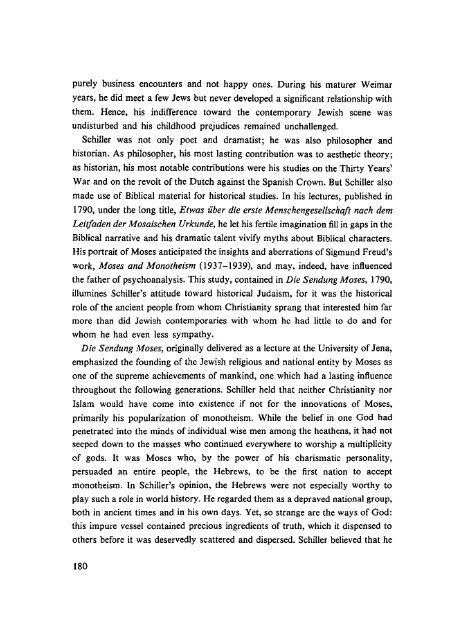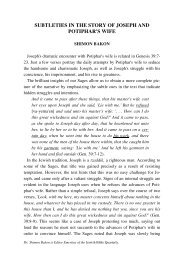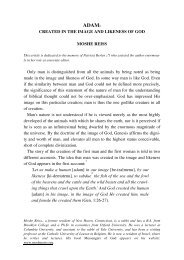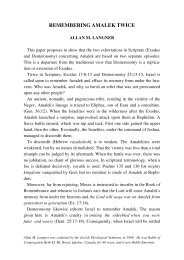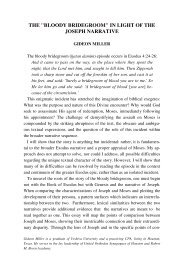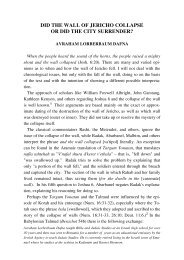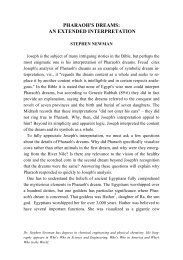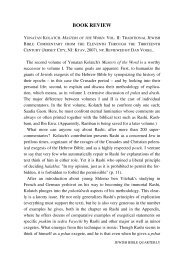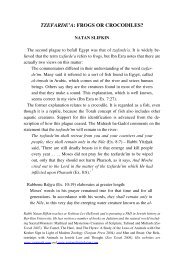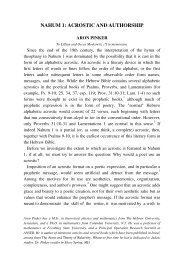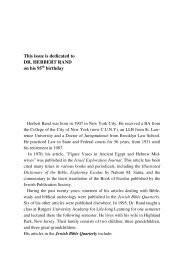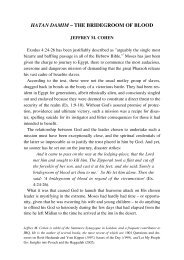The Development of Biblical Prayer - Jewish Bible Quarterly
The Development of Biblical Prayer - Jewish Bible Quarterly
The Development of Biblical Prayer - Jewish Bible Quarterly
You also want an ePaper? Increase the reach of your titles
YUMPU automatically turns print PDFs into web optimized ePapers that Google loves.
purely business encounters and not happy ones. During his maturer Weimar<br />
years, he did meet a few Jews but never developed a significant relationship with<br />
them. Hence, his indifference toward the contemporary <strong>Jewish</strong> scene was<br />
undisturbed and his childhood prejudices remained unchallenged.<br />
Schiller was not only poet and dramatist; he was also philosopher and<br />
historian. As philosopher, his most lasting contribution was to aesthetic theory;<br />
as historian, his most notable contributions were his studies on the Thirty Years'<br />
War and on the revolt <strong>of</strong> the Dutch against the Spanish Crown. But Schiller also<br />
made use <strong>of</strong> <strong>Biblical</strong> material for historical studies. In his lectures, published in<br />
I 790, under the long title, Etwas iiber die erste Menschengesellschaft nach dem<br />
Leiifaden der Mosaischen Urkunde, he let his fertile imagination fill in gaps in the<br />
<strong>Biblical</strong> narrative and his dramatic talent vivify myths about <strong>Biblical</strong> characters.<br />
His portrait <strong>of</strong> Moses anticipated the insights and aberrations <strong>of</strong> Sigmund Freud's<br />
work, Moses and Monotheism (I937-1939), and may, indeed, have influenced<br />
the father <strong>of</strong> psychoanalysis. This study, contained in Die Sendung Moses, 1790,<br />
illumines Schiller's attitude toward historical Judaism, for it was the historical<br />
role <strong>of</strong> the ancient people from whom Christianity sprang that interested him far<br />
more than did <strong>Jewish</strong> contemporaries with whom he had little to do and for<br />
whom he had even less sympathy.<br />
Die Sendung Moses, originally delivered as a lecture at the University <strong>of</strong> Jena,<br />
emphasized the founding <strong>of</strong> the <strong>Jewish</strong> religious and national entity by Moses as<br />
one <strong>of</strong> the supreme achievements <strong>of</strong> mankind, one which had a lasting influence<br />
throughout the following generations. Schiller held that neither Christianity nor<br />
Islam would have come into existence if not for the innovations <strong>of</strong> Moses,<br />
primarily his popularization <strong>of</strong> monotheism. While the belief in one God had<br />
penetrated into the minds <strong>of</strong> individual wise men among the heathens, it had not<br />
seeped down to the masses who continued everywhere to worship a multiplicity<br />
<strong>of</strong> gods. It was Moses who, by the power <strong>of</strong> his charismatic personality,<br />
persuaded an entire people, the Hebrews, to be the first nation to accept<br />
monotheism. In Schiller's opinion, the Hebrews were not especially worthy to<br />
play such a role in world history. He regarded them as a depraved national group,<br />
both in ancient times and in his own days. Yet, so strange are the ways <strong>of</strong> God:<br />
this impure vessel contained precious ingredients <strong>of</strong> truth, which it dispensed to<br />
others before it was deservedly scattered and dispersed. Schiller believed that he<br />
ISO


